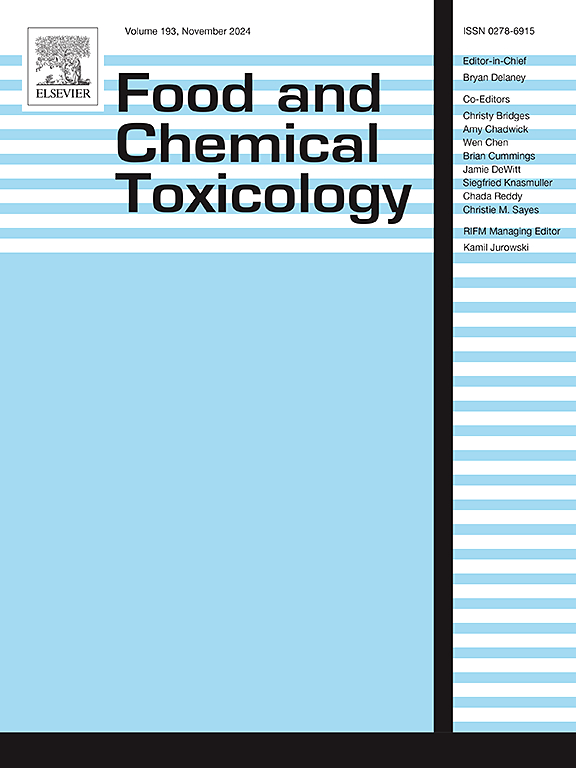Polysorbate 80 and carboxymethylcellulose: A different impact on epithelial integrity when interacting with the microbiome
IF 3.9
3区 医学
Q2 FOOD SCIENCE & TECHNOLOGY
引用次数: 0
Abstract
The consumption of dietary emulsifiers, including polysorbate 80 (P80) and sodium carboxymethylcellulose (CMC), has raised safety concerns due to its interaction with the intestinal microbiome. This study demonstrated that increasing concentrations of P80 and CMC added to a dynamic four-stage gut microbiota model (BFBL gut simulator) altered the microbiome composition and impacted epithelial integrity in a dose-dependent manner. 16S rDNA amplicon-based metagenomics analysis revealed that these emulsifiers increased microbial groups with proinflammatory capacities while decreasing microbial taxa known to enhance barrier function. Increasing doses of P80 significantly decreased Bacteroides dorei and Akkermansia, taxa associated with anti-inflammatory potential, while increasing doses of CMC were linked to a higher abundance of Ruminococcus torques and Hungatella, which negatively impact barrier function. Both emulsifiers displayed a different impact on epithelial integrity when interacting with the microbiome. On one hand, supernatants from the BFBL simulator fed with P80 disrupted epithelial integrity to a lesser extent than the additive alone. On the other hand, both the microbiota and the supernatants from the BFBL simulator fed with CMC diminished the epithelial integrity, though the additive itself did not. These findings highlight the need to incorporate the gut microbiome in the risk assessment of these additives.

聚山梨酯80和羧甲基纤维素:与微生物群相互作用时对上皮完整性的不同影响。
食用乳化剂,包括聚山梨酸酯80 (P80)和羧甲基纤维素钠(CMC),由于其与肠道微生物群的相互作用而引起了安全问题。该研究表明,在动态四阶段肠道微生物群模型(BFBL肠道模拟器)中添加P80和CMC浓度的增加会以剂量依赖的方式改变微生物组组成并影响上皮完整性。基于16S rDNA扩增子的宏基因组学分析显示,这些乳化剂增加了具有促炎能力的微生物群,同时减少了已知具有增强屏障功能的微生物群。增加P80剂量可显著降低与抗炎潜力相关的多拟杆菌和Akkermansia类群,而增加CMC剂量可增加Ruminococcus torques和Hungatella的丰度,从而对屏障功能产生负面影响。当乳化剂与微生物群相互作用时,两种乳化剂对上皮完整性的影响不同。一方面,添加P80的BFBL模拟器上清液对上皮完整性的破坏程度低于单独添加添加剂。另一方面,添加CMC的微生物群和BFBL模拟器的上清液都降低了上皮的完整性,但添加剂本身没有降低上皮的完整性。这些发现强调了在这些添加剂的风险评估中纳入肠道微生物组的必要性。
本文章由计算机程序翻译,如有差异,请以英文原文为准。
求助全文
约1分钟内获得全文
求助全文
来源期刊

Food and Chemical Toxicology
工程技术-毒理学
CiteScore
10.90
自引率
4.70%
发文量
651
审稿时长
31 days
期刊介绍:
Food and Chemical Toxicology (FCT), an internationally renowned journal, that publishes original research articles and reviews on toxic effects, in animals and humans, of natural or synthetic chemicals occurring in the human environment with particular emphasis on food, drugs, and chemicals, including agricultural and industrial safety, and consumer product safety. Areas such as safety evaluation of novel foods and ingredients, biotechnologically-derived products, and nanomaterials are included in the scope of the journal. FCT also encourages submission of papers on inter-relationships between nutrition and toxicology and on in vitro techniques, particularly those fostering the 3 Rs.
The principal aim of the journal is to publish high impact, scholarly work and to serve as a multidisciplinary forum for research in toxicology. Papers submitted will be judged on the basis of scientific originality and contribution to the field, quality and subject matter. Studies should address at least one of the following:
-Adverse physiological/biochemical, or pathological changes induced by specific defined substances
-New techniques for assessing potential toxicity, including molecular biology
-Mechanisms underlying toxic phenomena
-Toxicological examinations of specific chemicals or consumer products, both those showing adverse effects and those demonstrating safety, that meet current standards of scientific acceptability.
Authors must clearly and briefly identify what novel toxic effect (s) or toxic mechanism (s) of the chemical are being reported and what their significance is in the abstract. Furthermore, sufficient doses should be included in order to provide information on NOAEL/LOAEL values.
 求助内容:
求助内容: 应助结果提醒方式:
应助结果提醒方式:


